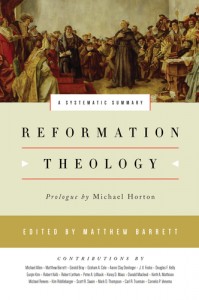Review of Reformation Theology: A Systematic Summary Edited by Matthew Barrett
In a year that has seen (and no doubt will continue to see) many, many books on the Reformation released to the public, Reformation Theology is certainly going to be one of the most thorough. It is a systematic theology that walks through the thought of key Reformers on topics ranging from predestination to baptism to the Trinity. (And of course, while it is for laymen, it’s not really for dummies.) 
Here are a few of my thoughts on this large book:
- As with any edited volume, some chapters are better than others. A few chapters that stood out to me as especially good were the two chapters on the historical background of the Reformation, the chapter on justification by faith alone, and the chapter on the relationship between church and state.
- I read this book cover to cover (mostly since I had been asked to review it), which isn’t the best way to approach a text like this. Like any other systematic theology, it’s best to go topic by topic and just read what you’re interested in. And there is a lot here to be interested in. One of the main strengths of Reformation Theology is how thorough it is in discussing the main thinkers from the Reformed and Lutheran traditions.
- And that last point does highlight one weakness with the text—and I should note that this is a weakness that probably cannot be overcome. Namely, the Anabaptists make little showing, other than as foils for the Reformers to argue against. In one sense this is entirely correct. There’s really no way to ever write an “Anabaptist Systematic Theology.” The Anabaptists were far too diverse and scattered—and far too often simply nuts—to ever be truly systematized. And yet, as someone whose views of baptism and ecclesiology looks much more like the Anabaptists than the Lutherans or Reformed, I can wish they had gotten more attention in the text. Still, that would likely have made a nearly-800 page book into a thousand page book (or more), and it’s perfectly understandable why the editor went the direction he did.
- With all of that said, Michael Horton is entirely right to point out in the Preface that the Reformation really had, and still has, two enemies: Roman Catholicism (which everyone knows) and the ‘enthusiasts.’ If the Roman Catholics then and now added their human beliefs and traditions to Scripture, the enthusiasts (mostly Anabaptists) would take away from Scripture by replacing it with the desires of their own hearts in the name of being moved by the Spirit. Individuals making up revelation from God that pretends to be from the Holy Spirit is as anathema to the Gospel and the Christian life as individuals making it up in the name of the Magisterium or the tradition. In both cases. Reformation Theology provides a needed corrective, and is well worth your time and attention.
All that to say, the book is excellent and you should have it on your shelf as a reference.
This book was provided for free by the publisher for review purposes. I was not required to provide a positive review–though I am delighted to have done so. It really was a good book.
Dr. Coyle Neal is an Assistant Professor of Political Science at Southwest Baptist University in Bolivar, Missouri.












